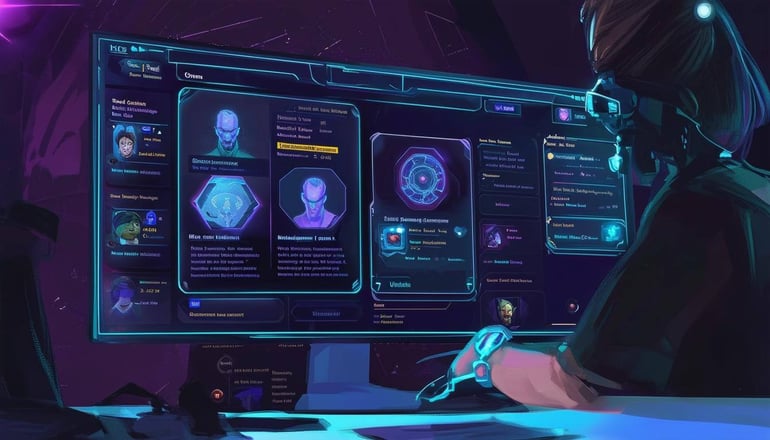
Enhancing Your Campaign with AI
- October 15 2024
- Courtland Goldengate
Running a tabletop role-playing game (TTRPG) campaign, like Dungeons & Dragons, is a rewarding but demanding task for any Game Master (GM). Crafting a rich world, keeping track of character backstories, generating encounters, and answering rules questions all require significant effort. With the advent of AI tools, however, managing these complexities becomes much easier. Here’s how integrating an AI-powered assistant into your TTRPG campaign can transform the experience, providing personalized assistance that adapts to every story and game world.
1. Remembering Past Events: Keeping the Story Coherent
One of the biggest challenges in long-term campaigns is remembering everything that has happened—character arcs, critical decisions, and world-changing events. An AI assistant with memory capabilities can be a game-changer here. It can recall past events from the campaign, such as:
- Key character interactions: Remembering when the party allied with a local baron or betrayed a guild leader.
- Story arcs: Recalling which NPC gave a crucial quest and how it turned out.
- World-building details: Keeping track of player-created locations or story elements introduced on the fly.
This continuity helps keep the campaign world feeling cohesive and dynamic. Players are often delighted when an NPC remembers their actions from several sessions ago, and an AI assistant ensures those moments aren't lost to time.
2. Generating Encounter Ideas: Tailored Challenges for Your Players
Every GM knows the struggle of coming up with fresh, exciting encounters on the spot. An AI assistant can generate encounters based on the current context of the campaign, considering:
- Character strengths and weaknesses: Adjusting the difficulty level or creature types to keep things challenging yet fair.
- Environmental factors: Creating encounters that fit the setting, like a band of raiders attacking in a desert or a mystical creature hiding in an ancient forest.
- Narrative hooks: Suggesting encounters that connect with ongoing storylines, like a rogue element from a previous arc reappearing for revenge.
This feature helps GMs maintain variety in their games and ensures that encounters feel relevant to the story and environment.
3. Answering Rules Questions: A GM’s Trusted Reference
Keeping track of every rule in a TTRPG can be overwhelming. With an AI assistant that understands the rules and can answer questions on the fly, GMs no longer have to pause the game to search through rulebooks. The assistant can:
- Clarify spell or ability interactions: Helping players understand how their character abilities work in specific scenarios.
- Offer quick rule references: Whether it’s the conditions for grappling or the rules for underwater combat, the assistant can provide precise answers quickly.
- Suggest rules interpretations: Offering guidance when the official rules are vague or when a GM wants to create a homebrew ruling that stays balanced.
This not only speeds up gameplay but also empowers GMs to focus on storytelling rather than rules arbitration.
4. Regenerating Creations: Endless Creative Iteration
Another standout feature is the ability to regenerate creations. Whether it’s NPC backstories, town descriptions, or magical artifacts, this function allows GMs to iterate on ideas until they find the perfect fit. Some uses include:
- NPC design: Quickly generating multiple versions of a town mayor or a mysterious sorcerer until you find one that fits the campaign’s tone.
- Magic items and artifacts: Creating unique magical items with tailored lore, making each one feel like a special addition to the world.
- Location descriptions: Generating vibrant descriptions for a new city or ruin, adjusting them to match the atmosphere the GM envisions.
This feature saves GMs time while allowing for infinite creative exploration, keeping the campaign world feeling rich and varied.
5. Personalized Player Experience: Adapting to Player Choices
Every TTRPG campaign is unique, shaped by the choices and personalities of the players. An AI assistant that adapts to these choices can provide tailored suggestions and story developments. It can:
- Track character backstories: Bringing in elements from a player’s backstory at opportune moments, such as an old mentor appearing in need of help or an enemy from the past seeking revenge.
- Customize story prompts: Suggesting new plot hooks that align with what interests the players, whether they’re drawn to political intrigue, combat challenges, or exploration.
- Respond dynamically to the story’s flow: Adapting to unexpected player decisions and offering new ideas that keep the game moving smoothly.
This dynamic approach means that players feel like their choices matter, and the story can evolve in organic ways that remain engaging for everyone involved.
Conclusion: Bringing AI into the Heart of the Game
With the launch of features like regenerating creations and a context-aware chat assistant, AI tools can now take on some of the heaviest lifting in TTRPG management. By helping to keep track of story details, offering tailored encounter ideas, answering rules questions, and providing endless creative inspiration, an AI-powered assistant makes running a campaign less stressful and more immersive.
Whether you’re a seasoned GM or a newcomer to the role, integrating AI into your campaign can help you focus on what matters most: creating memorable stories with your players. As AI technology continues to evolve, the possibilities for enhancing TTRPG adventures become even more exciting. Ready to take your game to the next level? Try out these new features and see how AI can transform your world-building and storytelling!

Leave your thought here